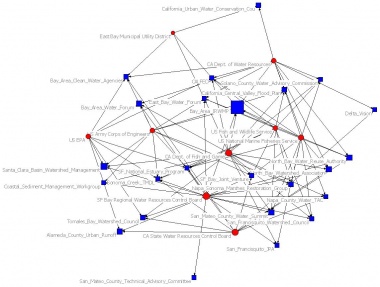
This research analyzes the interaction among policy actors as they seek solutions to to complex policy problems in multiple "governance" games. We study the local ecology of games in the San Joaquin-Sacramento Delta (CA), Tampa Bay (FL), and the Parana Delta of Argentina. The research involves surveys of policy stakeholders and statistical models of policy networks. We hope to understand the factors associated with cooperation, adaptive capacity, and resilience in these complex systems.
This research analyzes the interaction among policy actors as they seek solutions to complex, interrelated policy problems in local policy arenas. We want to know how actors decide which problems to tackle, what policymaking venues to participate in, and who to collaborate with in solving the problems. These individual decisions combined with the multiple governance institutions in a policy arena define the local ecology of games. We hypothesize that the patterns of collaboration, or policy networks, strongly affect the efficiency and effectiveness of governing institutions in resolving complex problems.
We study these questions in three estuaries located in California, Florida and Argentina, where problems such as declining water quality, dwindling water supply, flooding, and threats to biodiversity require coordinated action from multiple stakeholders. The three sites provide different mixtures of regulatory, collaborative, and voluntary institutions governing these issues, and thus provide an ample range of conditions in which to study our questions. Data will be collected from news media and internet analysis as well as surveys of all major policy actors in each estuary. Analytic techniques will include qualitative descriptions of the local ecologies as well as quantitative analyses based on Social Network Analysis (SNA) techniques.
The study seeks to integrate informal networks and institutional structure into a theory of governance more relevant to complex policy problems. In particular, we seek a better understanding of how natural resources are managed through cooperative activities when actors are embedded in complex policy-making systems. Many policy analyses focus on single policy programs, and advice from these studies can to lead to unintended consequences when they fail to recognize the complex interaction of actors, institutions, and problems within the full ecology of games. This study seeks to understand the interrelatedness of economic, environmental, and social benefits at stake in estuaries and similar ecological systems. In addition, our comparative study in the U.S. and Argentina provides the opportunity to analyze how different political cultures and national institutions affect the ability of policy actors to solve these key environmental problems.

Disqus Comments